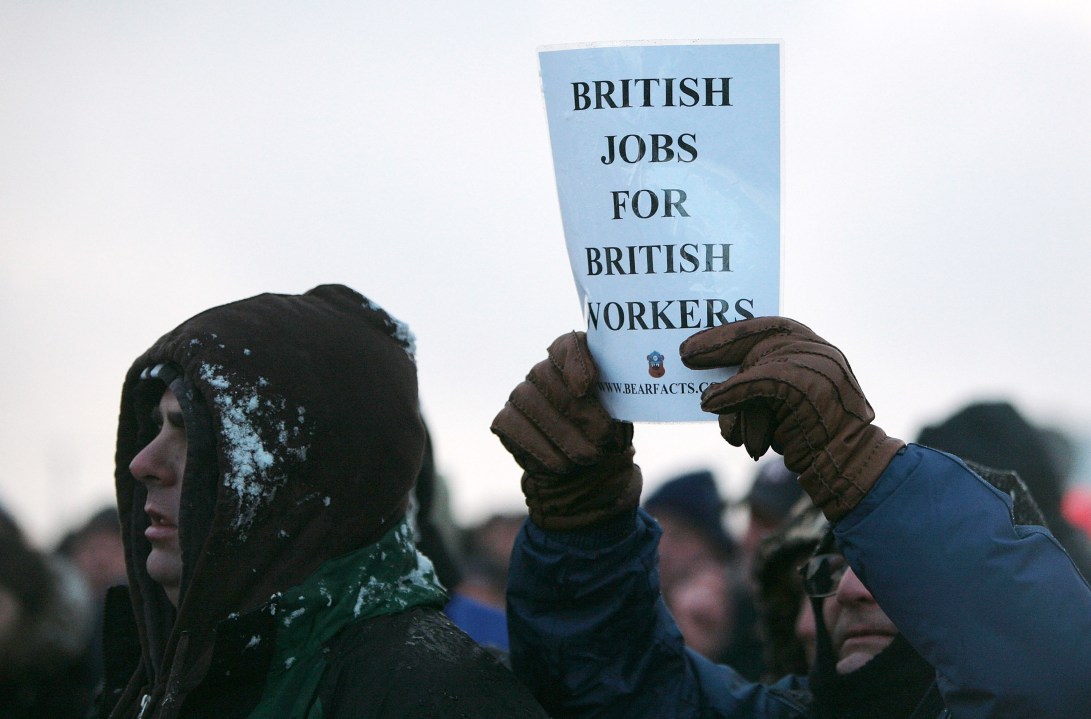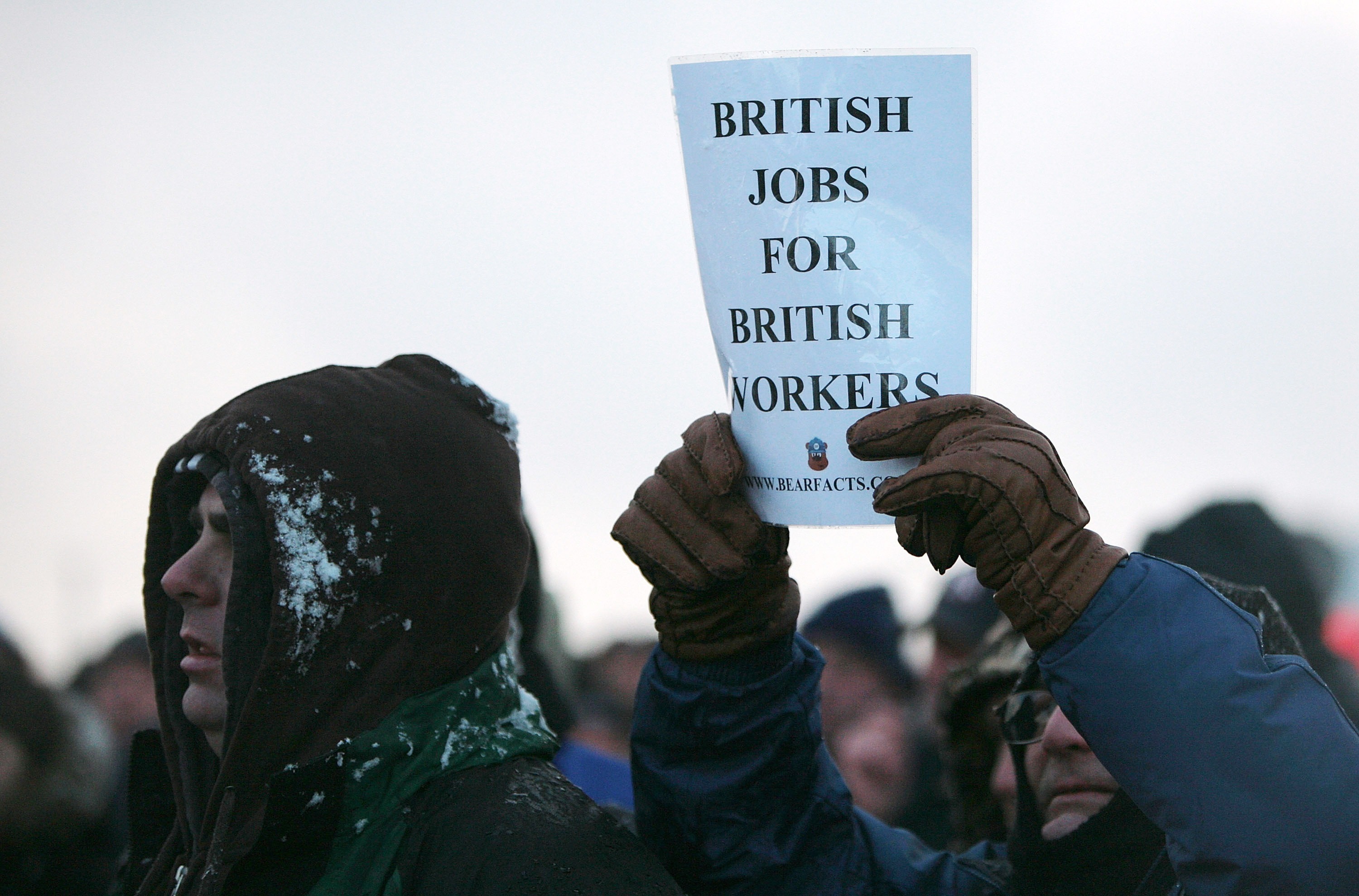 On top of our poll, we also put the question “Do you support the wildcat strikers?” to various friends of Coffee House. Here are some of their responses:
On top of our poll, we also put the question “Do you support the wildcat strikers?” to various friends of Coffee House. Here are some of their responses:
Matthew Parris
Businesses importing labour into recession-hit places need tact. An offshore barge filled with foreign workers was not unlawful but it was inflammatory. There’s something to be said for ministers being able to play Soft Cop to organised labour’s Hard Cop: look, you’re within your rights, old chap, but my friend Mr Wildcat-Striker has a nasty temper on him. Couldn’t we find a middle way?
Matthew Parris is a columnist for the Times and The Spectator
Douglas Murray
Yes. The wildcat strikes are a terrific demonstration of the ability of recessions to return us to reality. For years we have had European governments pushing us to enforce countless pieces of fanciful border-crossing legislation. But along comes a recession and all those same governments go unilateral in no seconds flat. There’s nothing wrong with that – it’s simply a reminder that this is the normal order of things. Nobody would bust their economy for the sake of a treaty ideal.
But the strikers also remind us of another point – that the so-called ‘under-class’ in the UK, which we have heard so much of in recent months, has in large part come about because our ‘working class’ has been imported. The damage this has done to our society has simply not been made up for in any other – least of all financial – way. This situation has itself rumbled on in part because anyone who mentions it has been castigated and shouted down as ‘racist’. It is amazing that we have come to a situation where it has effectively been made impossible to express the belief that people already living in the UK should be considered first for UK jobs and trained up for them if no such workers are available here.
All this said – though the strikes will do good for the awakening of public attitudes, there is no hope at all that our political parties will listen to the grievances of the strikers. We are currently caught between a party of government that talks tough on immigration and does nothing, and a Conservative party too callow to even discuss the matter. No alternative exists.
Douglas Murray is Director of the Centre for Social Cohesion
Rory Sutherland
No, I don’t support the strikes, since I am convinced of the benefits of free trade. I also believe the strikers should direct their resentment less at Italian workers than at British dossers – since their high taxes are paying for many of their neighbours to do nothing on benefits or very little in the public sector.
That said, I like my free trade to come with free speech. And I can’t help feeling that, for the last ten years, the indigenous working class has been pretty much gagged. Any sentiment which does not accord with the metropolitan “Called Tomasz my wonderful plumber after a lovely Congolese meal in Islington” school of multiculturalism is seen as zenophobic. Yet the fact remains that large-scale immigration and globalisation benefits one sector of British society at the expense of another. It’s time this was allowed a proper airing. And, while on the subject of free speech, can anyone tell me what legal power has been used to shut down the discussion board at www.ukwelder.com? It’s not that I am a heavy user of the site – I’d just like to know.
Rory Sutherland is vice-chairman of Ogilvy Group UK and a columnist for The Spectator
Martin Bright
This is the ultimate liberal dilemma – a reactionary strike. Unlike Gordon Brown, I certainly don’t have a problem with workers withdrawing their labour or even wildcat strikes if the cause is just. But I find myself torn on this one. The language of some of the strikers is xenophobic but it is difficult not to feel sympathy for people who have no work. Mandelson’s dismissive approach is guaranteed to alienate, and in a way this is the reckoning the government deserves for attempting to sell the ideology of the global market with the rhetoric of jingoism. British jobs for British workers?! Please!
Martin Bright is former political editor of the New Statesman
Susan Hill
Ooohhh, I’ve come over all nostalgic. If you lived through the 70s as a grown-up, and came through, then you’ve a soft spot for them bringing the country to a halt. I’m all for them – never mind who you vote for, it wakes a government up, makes them realize we`re not supine. I love ‘em. Great brawny men in hard hats waving their fists and carrying placards, Union leaders with beer bellies on soap boxes yelling into those His Master`s Voice megaphones. Never mind the reason for a strike, we just should have them from time to time – like snowfalls we must now call ‘events’ and power cuts we must call ‘outages,’ they add to the gaiety of nations. Seriously. Do I agree with the wildcat strikes by British workers for British jobs? Yes. Desperate times call for Desperate Remedies.
Susan Hill is a novelist and Spectator contributor
Hardeep Singh Kohli
Wildcat strikes seem to be a large sledgehammer to crack a medium sized (yet worrying) nut. Yet one can only empathise with the vulnerability of workers at such trying times. There are definite issues about the rights of UK workers within a wider European context. But negotiations need to be carried out without the added febrility of unconnected actions. One might understand wildcat strikes to force a government to change policy, but in this case the government isn’t directly responsible for the actions of the employer.
Hardeep Singh Kohli is a comedian and contributing editor of The Spectator
Look out for Rod Liddle’s cover piece on the strikes in tomorrow’s issue of the magazine.







Comments